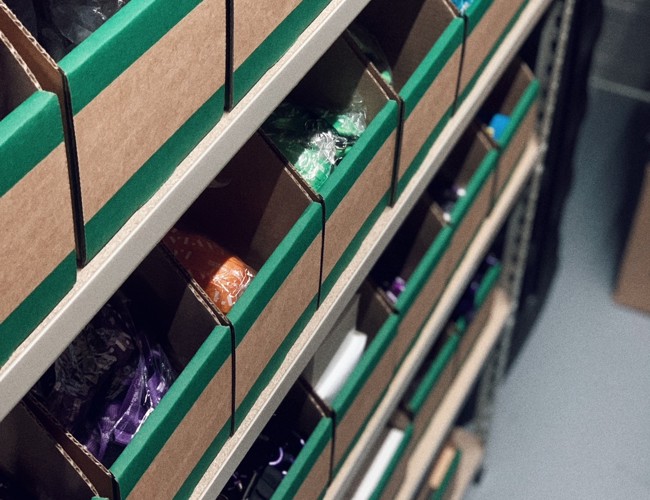Reviewed: Reuters, Roadmaps and Reports
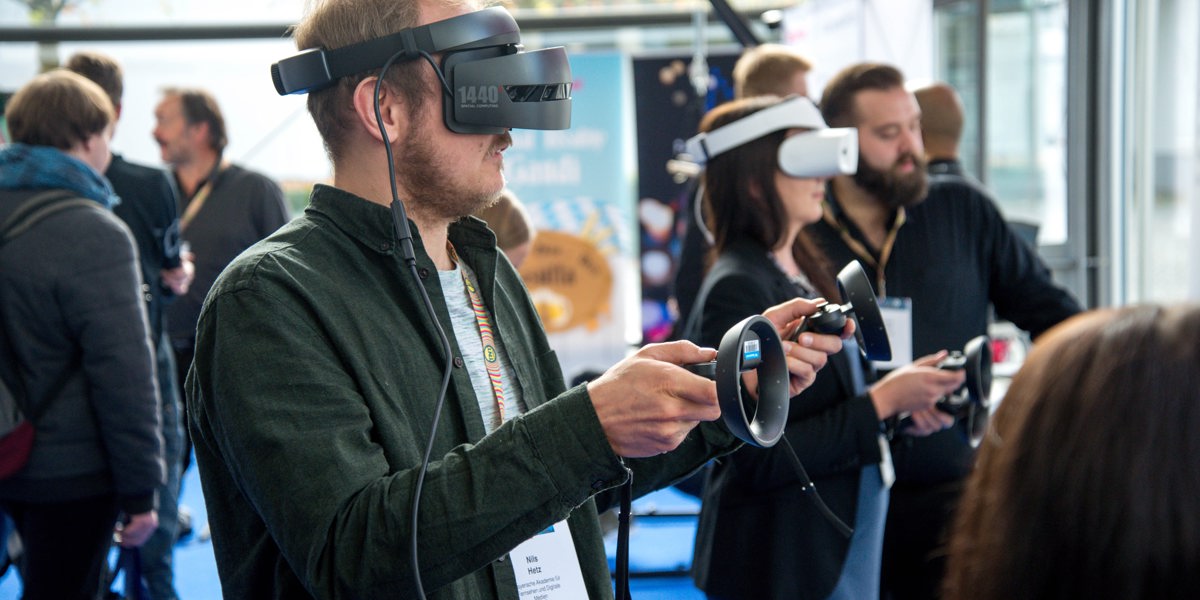
We have all heard that 2020 was an "unprecedented" and "truly unique" year, and in its executive summary of their January report the Reuters Institute classifies 2021 as a "year that we’ll discover how fundamental those changes [from 2020] have been". Following the UK’s roadmap out of lockdown and all the reports released in the first two months of this 2021, we thought that we would cut through the noise and summarise key takeaways and trends to look for in the coming year.
In its most basic form, it is fair to say that analysts have high hopes for 2021 - in every aspect of the human experience. The rollout of vaccination schemes and the growing number of vaccines available will pave the way for a return to "normal" life.
In this piece I will discuss which trends to look for over the next 12 months and the impact that 2020 has had on the events industry and businesses as a whole.
The Hybrid Workplace
The Reuters Institute report identifies businesses as having "a key challenge…to move from crisis mode towards a sustainable hybrid in-person/remote model".
By far one of the biggest shifts we have seen over the past 12 months has been the mass migration to remote working. Working remotely or homeworking was not a new concept pre-COVID and had been growing in popularity, but it is clear the pandemic sped up this transition. Between January and December 2019, the UK’s ONS (Office of National Statistics) found that fewer than 30% of the workforce were working from home; following Boris Johnson’s first lockdown announcement on March 23rd, ONS saw an increase to 46.6% of people (in employment) working from home in April 2020.
Is this change sustainable?
Absolutely! Both employees and employers have had a positive response to remote working. As I discussed last year in From Standing Desks to Virtual Reality: How we are Adapting to the New Event Industry, in June Gartner asked 127 company leaders their intentions regarding flexible working post COVID-19: 82% answered that they would let employees work remotely some of the time, and 47% would allow employees to completely work from home. A recent report by Microsoft Surface and YouGov found that 74% of employees surveyed feel their company actively encourages them to work from home.
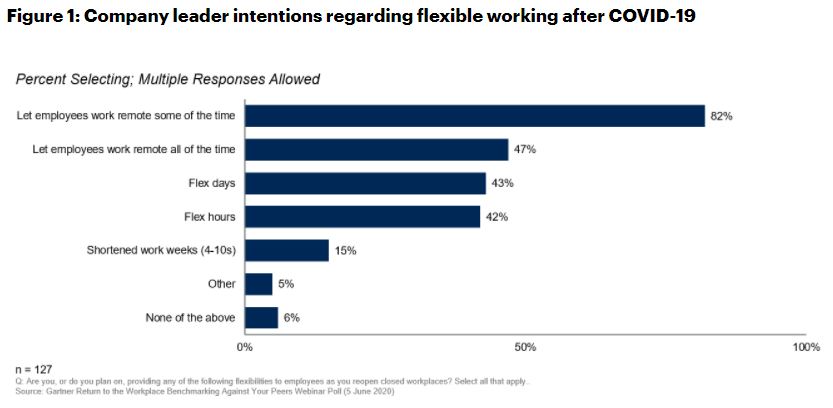
The best example of how both employees and companies are dedicated to working from home is demonstrated in the soar of "puppy price" as reported in this BBC Scotland article. People were adopting and purchasing puppies in record numbers as they were committed to remaining in that home working environment and knew they had time to train said puppies.
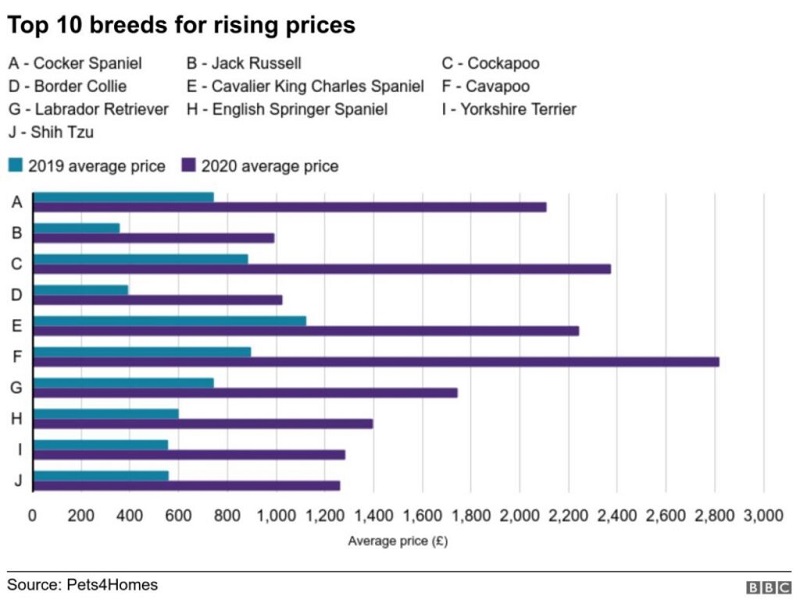
Change in consumer habits
Throughout 2020 much of the global population had limitations on where and how they could shop, work, and move about. The already popular online shopping was amplified, and we have seen that those who were not prepared for it have unfortunately lost out; with the British online-only ASOS brand buying the bricks-and-mortar Topshop and Miss Selfridge brands for £330m. Reuters addressed the economic shift: “this will also be a year of economic reshaping, with publishers leaning into subscription and e-commerce – two future-facing business models that have been supercharged by the pandemic”.
This shift is also identifiable in business consumer habits. The boundary between work space and home life became increasingly blurred, video calls provided a window into your customer's personal life as many sat in their living rooms, bedrooms, and kitchens. In 2021 we should see an increased effort to get to know your customers and create a more personalised marketing strategy, and B2B marketing is no exception. The switch to a more considered and personal approach as we spend more time homeworking for the foreseeable future is essential for B2B retention and growth. An example of one strategy we have seen a positive response from, is our "stay connected" boxes; these bundles, sent direct to delegates/customers, can start the buzz and engagement or can act as an incentive for participation, depending upon your overall objectives. The behaviour and changes we discussed in From Puppies to Podcasts – How Consumer Marketing Paves the Way for B2B Audience Engagement is set to continue.
Revenue diversification
With many businesses forced to temporarily close their doors last year, we saw not only saw an acceleration to e-commerce, but we also saw business owner innovation to diversify their revenue streams. From local businesses like Ealing’s Red Lion pub open as a community store and a hairdresser in Chiswick selling candles online, to publishers like Buzzfeed releasing ice-creams; innovation was the word of the day. Reuters identifies revenue diversification as an economic trend that this will continue throughout 2021.
Events
Virtual events have allowed our clients to increase their reach and do things they were not previously viable. However after a year of lockdowns, it is fair to say that the one thing we are more appreciative of than ever before is basic human contact, so is it any wonder that in 2021 “we can expect a thirst for face-to-face contact…Real-life events are set to make a comeback this year, as Zoom fatigue kicks in”. Despite British PM Boris Johnson’s Roadmap out of Lockdown looking to re-open England by June 21st, we will still have to traverse through international COVID-19 regulations; with the potential of local lockdowns as well as individual country and travel restrictions. The solution is hybrid: creating and planning for events to be accessed from wherever your delegates are in the world with the ability for local bubbles or a central event venue.
Podcasts
People are looking for content that can be delivered in bitesize, snackable chunks that they can adapt to their current working environment. Writing this I can tell you that I start my work day by listening to three podcasts. Reuters found that 31% (of the 40,000 surveyed) in their June Digital News Report had accessed a podcast monthly. And although we saw the work commute fade away, which was previously the most popular time to listen to podcasts, we saw the afternoon emerge as a popular time to listen to podcasts.
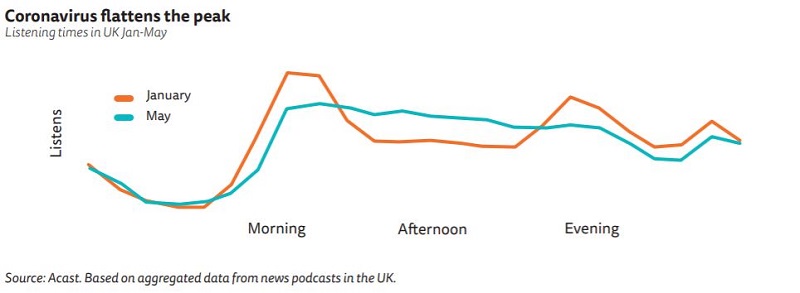
We can also look to the following as indicators of podcast popularity and prosperity:
- The sheer number of podcasts:
- In 2020 Podcasts Insight reported that there are 850,000 active podcasts (over 30 million individual episodes).
- Not only did we see a rise in the number of podcasts this year, but we also saw an increase in specialist podcasts:
- There were tens of ‘pop-up’ podcasts relating to the pandemic from Coronacast to BBC News’ Coronavirus Newscast.
- Reuters Institute only had to look to six countries to find 100 native daily news podcasts.
- Platforms are investing more:
- Spotify, Apple, BBC Sounds and Amazon have all been signing small independent publishers and battling each other for the top spot.
- Reuters also reported “Spotify has led the way paying a reputed $100m for The Joe Rogan Experience”, demonstrating the future of podcast monetisation.
- Increase in celebrity podcasts and endorsed interests:
- Reuters labelled 2021 as a “Battle for the stars”, as more and more celebrities get involved from Prince Harry and Megan, to Conan O’Brien, to Ferne Cotton to and Michelle Obama.
- With the ever-increasing reach and status of the influencers it is clear that the podcast ‘trend’ will not be going away anytime soon.
- The populism of video podcasts
- Marketing capabilities:
- eMarketer found that more than half of listeners are at least somewhat more likely to consider purchasing products if they hear it advertised on a podcast.
- eMarketer expects advertising revenues to surpass $1 billion in 2021.
- Podcasts can also be used as a marketing tool, we recently found success marketing the Citrix EMEA
- Workspace Summit via podcasts which discussed the three event themes (remote, resilience and reinvent) and as a result of their omnichannel approach, saw over 400 delegate downloads and interact in advance of the event.
AR (Augmented Reality)
Augmented Reality (AR) is an interactive experience of a real-world environment where the objects that reside in the real world are enhanced by computer-generated perceptual information.
AR redefined the retail reality during the pandemic. With so many of us shopping online, retailers had to offer a new way to view products when we couldn’t visit showrooms. From Ikea’s AR Ikea Place to L'Oreal’s cosmetic shopping experience, consumers not only enjoy but have positive experiences utilising AR in daily life.
We have also found great success when using AR invitations, at a recent event for one of our large Tech clients, we found the AR email invite had the highest email registration conversion rate compared to its registration email counterparts. Click this link to see what can be done utilising AR.
AI (Artificial Intelligence)
Artificial Intelligence (AI) refers to the branch of computer sciences used to programme machines to perform tasks that would typically require human intelligence.
In December 2020 we published How Artificial Intelligence has Revolutionised the Virtual Event Environment where we discussed the uses for AI in the events industry. Without repeating too much of what we discussed in the article, I will highlight the three important areas of advancement anticipated for 2021:
- Automation of multi-media formats from text
- In the fast-paced globalised world we live in, companies are always looking to stay ahead and communicate clearest. AI storytelling offers automated and visual formats to communicate with your audience.
- The BBC is already experimenting with AI tools that turn a text news story into a ‘visual story’ suitable for mobile phones with pull quotes and animations.
- Imagine what can be done if we translate this technology to the events sector or the abilities to communicate a brand story.
- AI and Accessibility
- Opening up new avenues for increasing accessibility to audiences with technologies such as AI-powered synthetic voice. The BBC introduced this particular feature on its international digital platform in November 2020.
- Automation of new languages
- As cited in our above-mentioned article, the advances in machine learning are helping to breakdown the language barriers at such an integral time. With a focus on virtual and hybrid events, AI platform integration can allow for immediate multi-language communication.
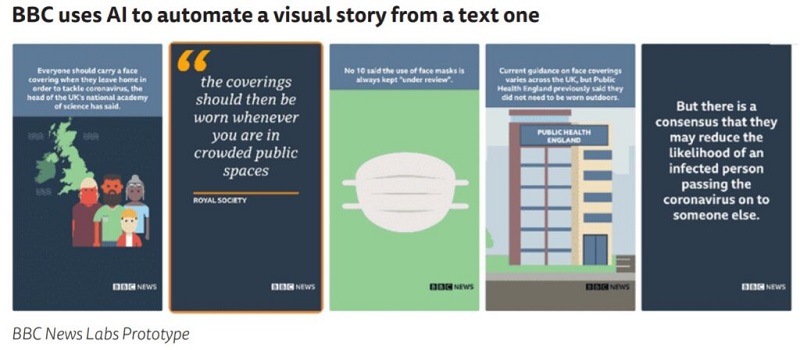
Although the capabilities of AI tools are both fascinating and useful, many have identified the risk of the improved technology with the emergence of ‘deepfakes’. Deepfakes are defined as synthetic media in which a person in an existing image or video is replaced with someone else's likeness.
Understandably, stealing someone’s likeness has the potential to damage economies and political agreements. Thus far this AI tool has not been used in a detrimental way, but with all technology it is important to acknowledge both the positive and negatives it offers to society.
I will leave you all with the thought that this year and the future will be all about hybrid, from cars to events to the workplace, by definition, hybrid is a thing made by combining two different elements. This year we will be navigating how to marry the ‘old-normal’ and (what became) our ‘new-normal’ from 2020, to “find the right balance between efficiency and creativity”.
To find out more information about how Outsourced Events can help you navigate hybrid events and increase your engagement with your audience in the changing world, or to speak to us about anything else discussed in this article, please get in touch.
To read more about the future of events checkout our article Event Planning in 2021.
Our Latest Knowledge & Insights

The Power of Experiential Event Experiences
Today, events are all about making a splash. Gone are the days of bland, boring gatherings, it’s about creating memorable experiences that linger long after the curtain closes. One of the current key trends in events is creating experiential experiences.
Read More
Natalie Chadwick-Dodd
Natalie joined the Outsourced team in June 2023. She has extensive experience in the hospitality industry with a particular focus on planning weddings and celebrations.
Read More
Emma Jackson
Emma, a former teacher, joined Outsourced Events in November 2021 and is aDigital Platform Manager. Her event planning experience and wedding planning business make her a creative problem solver with a customer focus.
Read More


